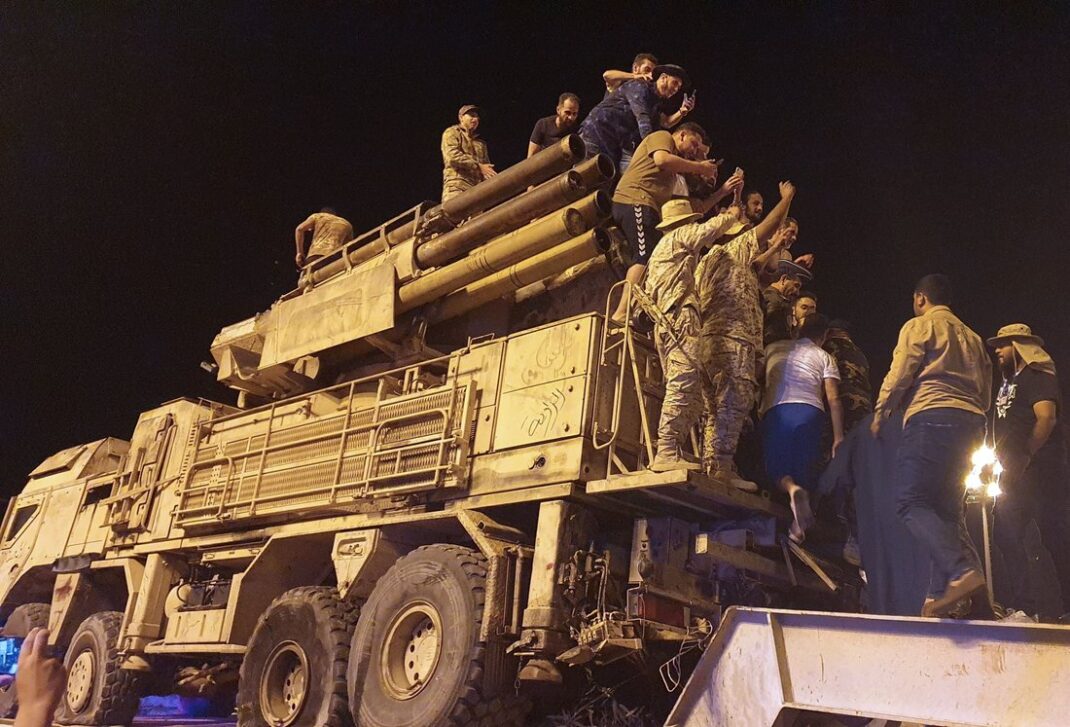By Şeyma Nazli Gürbüz
 Libya’s internationally recognized legitimate government’s fight against Haftar’s militia continues with new achievements every day; however, with the UAE’s constant backing of the putschist general, experts do not expect the conflict to end in the near future.
Libya’s internationally recognized legitimate government’s fight against Haftar’s militia continues with new achievements every day; however, with the UAE’s constant backing of the putschist general, experts do not expect the conflict to end in the near future.
.PART (II)
UAE: The main backer of Haftar
The UAE has spent a fortune supporting Haftar, despite his failures, against the country’s U.N.-recognized government.
Despite the international arms embargo on the war-torn country in place since 2011, the UAE has been continually looking for ways to get heavy and strategic weapons to Haftar and his forces in eastern Libya to overthrow the government since 2014.
After the Libyan Army’s last advancements, Abu Dhabi’s financial support for the war has increasingly come under scrutiny.
“It seems that the UAE’s primary goal is to replicate the Egyptian experience in Libya, to roll back the Arab Spring and to install a military-style dictator that is responsive to Emirati interests,” Megeresi expressed, adding that it is a largely ideological involvement.
In Kekilli’s opinion, however, when it comes to the UAE, saying the country simply became involved in the war is inaccurate since it actually fueled the war in the first place.
“It created Haftar as a militia force by supporting him with money and fighters. The UAE, alongside France and Israel, aims to create a political order in the region, control of which is in the hands of a military elite determined by them,” Kekilli stated, adding that Turkey’s efforts in the region foiled these aims of the UAE.
The U.N. Security Council’s Libya report, published in November 2019, confirmed the UAE’s support for Haftar.
Among the arms Abu Dhabi provided were millions of dollars’ worth of heavy weapons such as:
– $14.7 million Russian-made Pantsir S-1 air defense systems; $15 million South African Super Puma helicopters;
– $25 million of Yabhon armed drones made by the UAE; $100,000 Russian Orlan-10 armed drones;
– Soviet-made Antonov An-26 and Ilyushin IL-76 cargo aircraft;
– $2 million in Chinese-made Wing Loong II armed drones, Blue Arrow BA-7 and GP6 missiles;
– $250,000 of U.S.-made MIM-23 Hawk missiles; and UAE-made Nimr, Panthera, Spartan and Tygra armored personnel carriers.
The UAE also pays the salaries of a large number of foreign fighters-for-hire who have long fought for Haftar, such as Russian mercenaries, Sudanese Janjaweed militias and Chadian armed rebels.
Furthermore, UAE-owned companies carried 11,000 tons of military-grade jet fuel to illegitimate armed forces in Libya, despite the U.N. Security Council’s embargo.
UAE-Egypt ties at risk
The U.N. reports reveal that Egypt is also involved in violations in the Libyan war, allowing the UAE to use its territory.
Satellite images have shown that at least six Mirage 2000-9 fighter jets belonging to the UAE were stationed in the town of Sidi Barrani, located roughly 85 kilometers (53 miles) from Egypt’s western border with Libya.
However, the successive achievements of the GNA also had an impact on the partnership between the UAE and Egypt. Last week, Egyptian authorities accused the UAE of being responsible for the latest defeats inflicted by the Libyan Army on the militias of Haftar.
According to Canlı, for the UAE and Egypt, the Libya issue has turned into an existential problem.
“They continue to support Haftar nonstop. Haftar’s existence depends on how much support it gets. In my opinion, it is very hard for both UAE and Egypt to leave the table as winning powers, but they would continue to support Haftar at the risk of losing,” he said, adding that they are too involved to leave.
Russia plays it safe
However, the UAE and Egypt are not the only countries that support the illegitimate Haftar militias in Libya. The involvement of Russia, in particular, in the process has been reported many times by international agencies.
According to a confidential U.N. report by U.N. experts monitoring the arms embargo, mercenaries from Russia’s Wagner Group are in Libya, and Syrian fighters from Damascus are supporting Haftar in the region.
“We know that certainly, the Russians are working with Assad to transfer militia fighters, possibly third-country, possibly Syrian, to Libya, as well as equipment,” said the U.S. envoy for Syria, James Jeffrey, confirming Russia’s ties with Haftar at the beginning of the month.
However, Canlı expressed that Russia does not leave the GNA completely out of the game.
“They (Russia) see all the prominent Libyan actors, including Haftar and even Gadhafi’s son, as worth investing in. Russians prepare themselves for multiple alternative scenarios and try to come out as a winner in case of any of the outcomes,” he said.
Legitimacy key difference between sides
The foreign involvement in the war raises concerns as the U.N. acting Libya envoy Stephanie Williams last week warned that the foreign influx of weaponry, equipment and mercenaries to the country’s warring sides would intensify the conflict.
Yet, many experts make a distinction between the different types of foreign involvement as their influence over both Libya and the civil war varies.
“Generally, in western Libya, Turkey’s intervention came as a huge relief and is perceived as something which saved the cities and people of the region from years of brutal warfare against Haftar’s forces that would have likely destroyed Tripoli and other cities,” Megeresi expressed.
“In response, there is now growing antagonism toward the UAE for the role it played in driving Haftar’s project to take over Libya,” he said.
In Alessandri’s opinion, by upholding the GNA, Turkey has done what European countries for a long time advocated but did not, in the end, do.
“Of course Turkey has a national agenda too and expects a number of gains from its involvement – but has taken risks that others did not. It has become a key stakeholder and both gains and losses could be substantial depending on which way the conflict will go,” he underlined.
Kekilli, however, said he thinks that both sides want to have a solution to the conflict, which is their common value.
“However, there is one crucial difference: Turkey wants a civil and democratic Libya and wants to reach a solution through a political process. The ones who support Haftar, however, demand a military solution and want to see the establishment of a military dictatorship in Libya,” he emphasized.
Many highlight that there is also a legitimacy difference between the two sides, proving that supporting the internationally recognized GNA is not the same thing as supporting a putschist.
“Turkey supports the GNA on the grounds of legitimacy. However, the UAE and Egypt have an illegal presence in Libya. They are ghost actors,” Canlı said.
Peace to be reached after a rocky road
When it comes to the possibility of an end to the conflict, pundits express that although the memories of the failed past attempts still haunt Libya, there is hope for peace in the end, yet it may take a while to reach that point.
“The politically correct position is that there cannot be a military solution to the Libyan civil war. But developments in the MENA (Middle East and North Africa) after the Arab uprisings tell us that there are hardly any political outcomes that are not preceded or buttressed by military achievements. Peace will be achieved when military gains are exhausted,” Alessandri stated.
Previously, several U.N.-backed attempts to reach a cease-fire between Libya’s two rival forces have failed, and the world body has slammed repeated violations of a 2011 weapons embargo.
On Jan. 12, parties in Libya announced a cease-fire in response to a joint call by the leaders of Turkey and Russia. But talks for a permanent cease-fire ended without an agreement after Haftar left Moscow without signing the deal.
A week later, Haftar accepted the terms in Berlin to designate members to a U.N.-proposed military commission with five members from each side to monitor the implementation of the cease-fire. However, his blockade of Libyan oil fields overshadowed the summit in Berlin aimed at shoring up the shaky truce.
For Kekilli, eventually, there will be negotiations that will probably last for months and will be as harsh as the fight in the field.
“However, (unlike previous attempts such as Berlin), now the sides will come to the table with the acknowledgment of the fact that Haftar will not be able to enter Tripoli through war.
Since the deal with Turkey changed the power balance in the region for the benefit of Turkey, Haftar will have to negotiate,” Kekilli emphasized.
***
Şeyma Nazli Gürbüz is politics editor at Daily Sabah- an English language Turkish newspaper.
____________





